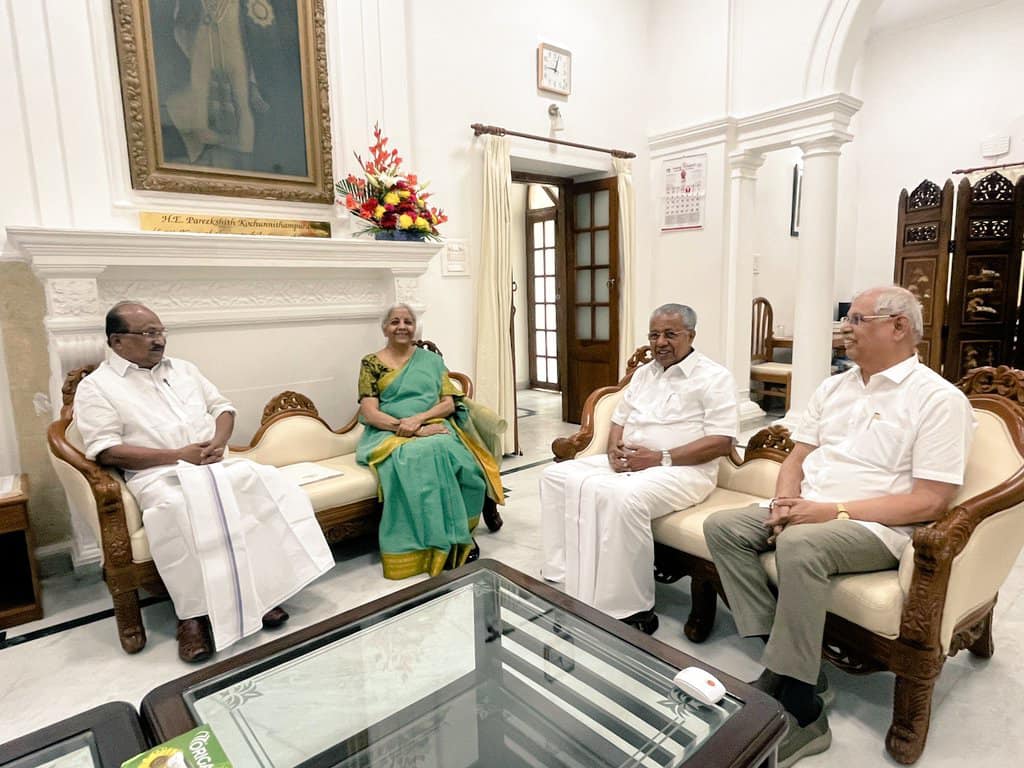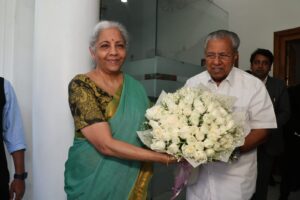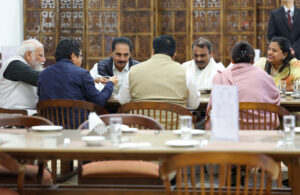Published Mar 21, 2025 | 9:00 AM ⚊ Updated Mar 21, 2025 | 9:00 AM

An image from the breakfast meeting between Pinarayi Vijayan and Nirmala Sitharaman on 12 March.
Synopsis: On 12 March, Kerala Chief Minister Pinarayi Vijayan shared an “unofficial” breakfast with Union Finance Minister Nirmala Sitharaman at Kerala House in New Delhi. The state government brushed it off as routine, but the Congress-led Opposition smelled a backdoor political deal. The grand old party also pointed out the double standards of the Left party.
In Kerala’s high-voltage political arena, Newton’s Third Law of Motion — for every action, there is an equal and opposite reaction — has found an unlikely proving ground. This time, the catalyst isn’t science but a breakfast meeting that’s stirring up a storm.
On 12 March, Chief Minister Pinarayi Vijayan shared an “unofficial” breakfast with Union Finance Minister Nirmala Sitharaman at Kerala House in New Delhi.
The state government brushed it off as routine, but the Congress-led Opposition smelled a backdoor political deal. The grand old party also pointed out the double standards of the Left party.
Just a year ago, on 9 February 2024, the CPI(M) had erupted in fury when Revolutionary Socialist Party (RSP) MP NK Premachandran had lunch with Prime Minister Narendra Modi at the Parliament Canteen.
Back then, the Left had unleashed scathing criticism. Now, as the tables turn, Premachandran wryly reminds the CPI(M): Every action has an equal and opposite reaction.

Chief Minister Pinarayi Vijayan welcoming Union Finance Minister Nirmala Sitharaman at Kerala House in New Delhi on 12 March.
With no details disclosed at first about what transpired during the breakfast meeting, speculation ran rife, providing ammunition for the Congress-led Opposition to allege secret political dealings between the CPI(M)-led government and the BJP.
An official communication on 12 March stated that the Union minister, who arrived at Kerala House around 9 am on Wednesday, was received by the Chief Minister and KV Thomas, special representative of the Kerala government in Delhi.
It further clarified that the meeting, which also saw the presence of Kerala Governor RV Arlekar, was unofficial and that the Union minister left after having breakfast.
However, the chief minister’s cryptic social media post on 12 March, mentioning the meeting but revealing no details about the discussions, only added to the intrigue, leaving room for interpretations and theories.
As the controversy gained momentum and the Opposition raised the issue in the Assembly, Vijayan was finally compelled to break his silence, attempting to downplay the meeting.
It was senior Congress leader and MLA Ramesh Chennithala who raised questions in the Kerala Assembly about the “unofficial” meeting.
Speaking during the discussion on Demands for Grants in the Budget for 2025-26 on 17 March, Chennithala cited a Public Relations Department (PRD) press release, which merely mentioned the timing and location of the meeting, without detailing the discussions.
He demanded transparency from the chief minister regarding the nature of the talks.
“The Governor is a good man, but he has politics. Governors in India always uphold politics,” Chennithala remarked, suggesting that the meeting could have political undertones.
He also pointed out that Sitharaman, as a key BJP leader, meeting Vijayan in an “unofficial” setting raised questions about potential political dealings.
“If the Governor is acting as a bridge in these interactions, are we wrong in seeing political motives behind it?” he asked, adding that the people of Kerala deserved to know what transpired in the meeting.
Meanwhile, the chief minister dismissed the Opposition’s allegations that the Governor played a role in facilitating his recent breakfast meeting with Sitharaman in New Delhi.
Addressing the Assembly during discussions on the state budget on 17 March, Vijayan clarified that the meeting was purely informal and that no official memorandum was submitted.
He emphasised that while issues concerning Kerala were discussed, the interaction remained a “friendly conversation,” and Sitharaman acknowledged some concerns as serious.
Refuting Chennithala’s claims that the meeting hinted at a closer relationship between the CPI(M) and BJP, Vijayan asserted that differing political ideologies are not diluted by such engagements.
“I have my own political views, as do the Governor and the Finance Minister. Politics does not dissolve when personalities with differing ideologies meet,” he said.
Vijayan further explained that he was in Delhi for a CPI(M) Polit Bureau meeting and attended a banquet hosted by the Governor for MPs upon Arlekar’s request.
He clarified that the Governor had expressed a desire to join the breakfast meeting but denied any backdoor negotiations, calling it a simple courtesy meeting.
Premachandran took a sharp dig at Vijayan, stating that such a meeting could not be dismissed as informal.
He alleged that the meeting’s unofficial nature raised suspicions, especially in light of the ongoing Serious Fraud Investigation Office (SFIO) probe into Exalogic Solutions, a firm linked to the chief minister’s daughter, Veena Vijayan.
“SFIO is under the Ministry of Corporate Affairs, which Sitharaman oversees. If the meeting was private, it is serious,” he remarked.
Leader of the Opposition in the Kerala Assembly VD Satheesan also joined the attack, highlighting the irony of Vijayan’s past criticism of political interactions with BJP leaders.
“The PRD’s press release called it unofficial — what does that mean? When Kerala is struggling financially, why wasn’t that discussed?” he asked.
Satheesan further recalled how Vijayan had previously condemned former minister Shibu Baby John for visiting Gujarat to study the industry and questioned, “What kind of unofficial discussion did this CM have?”
Further, in a turn of events, Youth Congress (Kerala) General Secretary Veena S Nair wrote to the Union finance minister, demanding the disclosure of details from her recent meeting with the chief minister.
Nair emphasised that despite repeated demands — even within the Assembly — the chief minister has refused to divulge any information about the discussion. This, she argued, has only strengthened the call for transparency, prompting her to take up the matter at the national level.
With political tensions flaring, the controversy surrounding the meeting refuses to die down.
Meanwhile, the CPI(M) seems to have played itself in a self-inflicted troll over what constitutes an “unofficial meeting.”
The party had launched a fierce attack against Premachandran for attending a lunch hosted by Modi in the Parliament canteen, branding it as evidence of his “newfound closeness” with the BJP and RSS.

PM having lunch with fellow MPs at Parliament Canteen, in New Delhi on February 09, 2024.
With the 2024 Lok Sabha elections in sight, the CPI(M) fanned the flames of controversy, questioning Premachandran’s political allegiance.
LDF convenor EP Jayarajan had then lashed out, asking, “What was the need and meaning of having lunch with PM Modi?”
“Premachandran is part of the UDF alliance. He was one of eight leaders invited for lunch by the prime minister. Why? What is the understanding between the BJP and UDF?” Jayarajan had questioned.
However, in a conversation with a news channel, Premachandran reflected on the storm that followed, revealing the emotional toll it took on him.
“That was also an unofficial meeting. But the CPI(M) went all out, alleging that I was moving towards the BJP and would soon become a Union minister. They staged protests in my constituency, convened press conferences, and ran a smear campaign that even planted doubts among some UDF leaders and within my own party. It was an uphill battle to clear my name,” Premachandran said.
Even as the Opposition accused Vijayan of striking backroom deals with Sitharaman, the latter reignited a fiery debate in the Rajya Sabha on 18 March.
During her reply to the Appropriation Bill 2025 discussion, Sitharaman took a sharp jab at Kerala, criticising the controversial practice of nokkukooli (compensation demanded for notional work) and alleging that communism had hindered industrial growth in the state, setting off a political firestorm.
Labour Minister V Sivankutty hit back, calling her statements misleading and accusing her of amplifying isolated incidents to malign Kerala.
Industries Minister P Rajeev went a step further, claiming Sitharaman’s “blind anti-communist stance” had fueled her anti-Kerala rhetoric.
Meanwhile, Satheesan saw a deeper game at play. He alleged a secret understanding between the BJP and CPM, saying, “There is great friendship and love between BJP leaders and CPI(M) leaders. But what the Finance Minister tried to do is to give the picture that there is no such bond between them.”
The irony of CPI(M)’s outrage over informal meetings seems to have come full circle, leaving the party scrambling to justify its shifting stance.
In Kerala’s ever-dramatic political theatre, where every handshake and meal is scrutinised for hidden agendas, the CPI(M) finds itself in an ironic predicament. The party that once vilified an “unofficial” lunch as a symbol of political betrayal now struggles to explain away its own “harmless” breakfast meeting.
The controversy has become a textbook case of what goes around, comes around. In politics, just like in physics, every action invites an equal and opposite reaction.
(Edited by Muhammed Fazil.)

